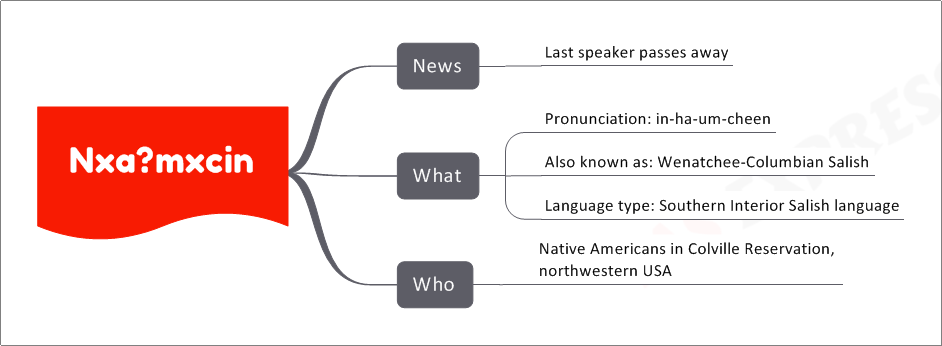n̓xaʔm̓xčín̓

The recent news of the passing of the last speaker of n̓xaʔm̓xčín̓ marks the end of an era for this unique and culturally rich language. Also known as Wenatchee-Columbian Salish, n̓xaʔm̓xčín̓ was a Southern Interior Salish language spoken by Native Americans in the Colville Reservation of northwestern USA.
This topic of “n̓xaʔm̓xčín̓” is important from the perspective of the UPSC IAS Examination, which falls under General Studies Portion.
Unraveling n̓xaʔm̓xčín̓
Pronunciation: in-ha-um-cheen
Language Type: Southern Interior Salish
n̓xaʔm̓xčín̓, pronounced as “in-ha-um-cheen,” was a linguistic treasure that held profound cultural significance for the Native American community in the Colville Reservation. This language, a member of the Southern Interior Salish language group, served as a vital bridge connecting generations, preserving ancestral wisdom, stories, and traditions.
The Last Breath of a Language
With the passing of the last speaker, n̓xaʔm̓xčín̓ faces the stark reality of extinction. The silence that now engulfs the language echoes the loss of an intricate web of communication, a unique worldview, and a connection to the past. As the last vestiges of n̓xaʔm̓xčín̓ fade away, the urgency of preserving endangered languages comes into sharp focus.
A Cultural Tapestry
The essence of n̓xaʔm̓xčín̓ extended beyond mere words; it encapsulated the identity, heritage, and traditions of the Native American communities it belonged to. This language served as a repository of stories, beliefs, and knowledge handed down through generations. Its loss reverberates not only linguistically but culturally, eroding the intricate tapestry of the community’s history.
The Legacy Carriers
The native speakers of n̓xaʔm̓xčín̓, the individuals who were its living vessels, held the key to unlocking a treasure trove of cultural nuances. Their ability to convey emotions, values, and nuances unique to the language was an irreplaceable gift. With their departure, the language’s legacy now lies in the hands of scholars, preservationists, and technology.
Preserving for Posterity
While the last speaker of n̓xaʔm̓xčín̓ may have passed, the imperative to preserve the language for future generations remains resolute. Documenting and archiving the remnants of n̓xaʔm̓xčín̓ through recordings, transcriptions, and research becomes paramount. These efforts, while unable to resurrect the spoken language, can ensure that its memory endures.

